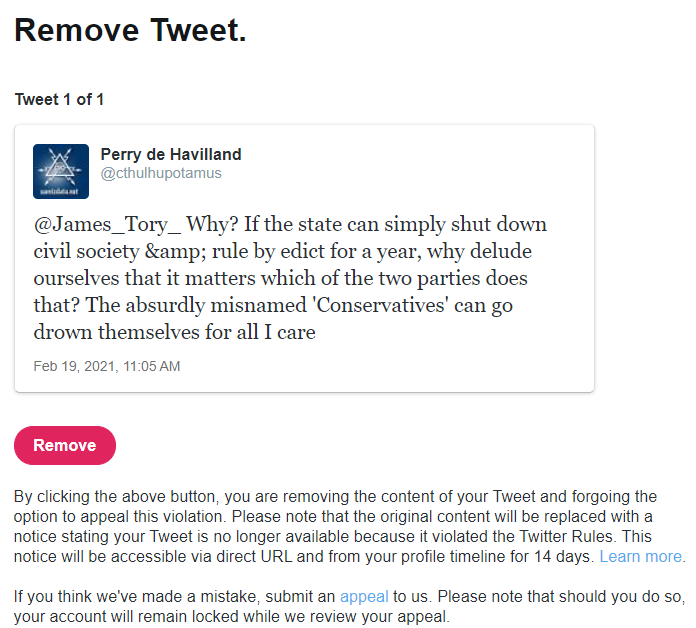Very interesting chat between CNN’s international correspondent Clarissa Ward in Afghanistan and Freddie Sayers of Unherd. This is great stuff and why independent media is so valuable.
|
|||||
|
The vulnerability of people expressing their views via other people’s platforms was pointed out by Glenn Reynolds back in the fairly early days of blogging when almost every blogger was hosted on a blogger.com site, with a .blogspot.com at the end (can’t find Glenn’s remark to that effect online but first half of the 2000’s I think). And .blogspot.com sites steadily became slow and buggy as hell. This technical risk largely ended when people moved away from the increasingly unreliable and clunky hosting and set up MoveableType or later WordPress sites hosted all over the place. But by 2010, blogs were no longer at the centre of what was now being called ‘social media’, with Facebook and Twitter being where the mass eyeballs were, blogs becoming more of a niche thing. This brings us back to the risks Glenn warned of, but dialled up to 11 this time, with less technical and more political concerns. I am seeing an interesting development in response to Big Tech shutting down voices dissenting from The Narrative, with people taking their discussions away from curated platforms like Twitter, Instagram and Facebook (who still get to act legally as if they are not curated platforms)… and onto Telegram groups, like for example the delightfully named Slightly Offensive (with posts like this) or global anti-lockdown stickerists White Rose. These groups are somewhat clunky and it is harder to spread interesting post via links (they are more phone/desktop app oriented rather than web-friendly), but this does show the social media landscape is still changing. Dear fellow friends of Brian, Many of you will have received Tim Evans’ email below with a message from Brian Micklethwait telling us that he has lung cancer. Brian asks that we boost his morale by telling him if and how we have been inspired or influenced by what he has written, said, or done. Since several of us at the IEA have been inspired by Brian, we would like to invite you to celebrate ‘the life of Brian’ Micklethwait on the evening of Friday September 3rd, at the Institute of Economic Affairs, 2 Lord North Street, London SW1P 3LB. The event will be from 6pm to 8pm, but you are welcome to stay on until Brian decides to go home. Consider it a special edition of Brian’s Fridays, with Brian being the topic rather than the host. If you are able to attend, please can you reply to VIPEvents@iea.org.uk so we know numbers in advance. If we have more than the maximum capacity of the IEA, we may have to seek another venue. Please save the date in your diary and forward this email to fellow friends of Brian who are not in Tim’s distribution list below. Can I also ask for a volunteer who would be willing to be the recipient of photos and short videos of Brian as well as video messages from those unable to join us, so that these can be shown on the evening. We will send further details over the next few weeks. In the meantime, please do keep emailing and/or phoning Brian and writing about him. I know Brian is looking forward to us all joining him on September 3rd. Best wishes, Professor Syed Kamall, Institute of Economic Affairs If you do not hold the ‘correct views’, the time is rapidly approaching that you need to find alternative venues for expressing those views. So set up your own blog (& do NOT host it with a company owned by Big Tech) and/or set up accounts on alternative platforms that do not depend on the very worst of Big Tech. It is only a matter of time before Twitter, Google & Amazon makes the decision for you, either kicking you off platforms they own directly or taking down other platforms they disapprove off by denying them hosting. Gab and Parler can be accessed via the web, and the Parler app can still be installed on Android devices. It’s a quick and easy process. And if you are still using an iPhone and want the app… consider making your current iPhone your final iPhone. Dissenting views are under attack and the people doing the attacks do not even need to hide the fact anymore.  On this day back in 2001, the first iteration of Samizdata haltingly plopped onto the internet, wide eyed and not quite sure what to make of itself. Why did Samizdata happen? Because every time a ‘news’ feature appeared about the 9/11 atrocity, I and other assorted stalwarts were done shouting at the television screen (remember them?). That was the trigger, but frankly there was much more to it than just that. It was years, decades really, of seeing the mainstream media’s disconnection from common sense and observable reality on a great many issues. We were sick of the BBC, Robert Fisk, CBS, The New York Times, ITV, Dan Rather, The Guardian, CNN, all of them. Glenn Reynolds created Instapundit and showed the way… and we followed (Samizdata was the UK’s second political blog, the first being the long vanished ‘Airstrip One’). Many more piled into the scrum, most now long extinct. Blogspot hosted most of the new online blurting initially, they were the blogosphere’s training wheels, even if most of us eventually moved elsewhere. We held blogger bashes, networked, and people got drunk and ended up with regrettable tattoos. I met Andrew Breitbart (truly amazing guy) and Arianna Huffington (um, yeah) and they were heady days, the wild west era of the opinionated internet. We had our own platform to say what we wanted to anyone who cared to listen (which back in the ‘golden age of blogging’ circa 2002-2008 was about 30,000 people a day for Samizdata, vastly more for Instapundit or Andrew Sullivan). We were social media before anyone called it social media. But times move on. Gradually the internet ecosphere changed, the cacophonous mosaic of a gazillion blogs were steadily overshadowed by bigger and taller things. In their place came walled gardens that commoditised the users in return for ‘free’ access, most prominently Facebook, YouTube and Twitter. The very term ‘blog’ seems a bit archaic now, I tend to use the term ‘independent site’ these days. And independent sites like this one remain, as does Instapundit, but we are just part of a much bigger and far more managed internet, a fringe sitting on the edge of the new on-line mainstream media, which is what Facebook, YouTube and Twitter are, the new mainstream media with all that implies. Heh, meet the new boss, same as the old boss; rolls of barbed wire are appearing atop the garden walls. With the internet rapidly becomes far more stage-managed and tightly controlled than I would have guessed possible almost twenty years ago, we are seeing a second wave of independent sites. And they are driven by the same discontent at the same MSM disconnect from reality that drove the first wave of new media post-9/11. Excellent slick new operations like The Critic, Unherd, Spiked, Quillette and others are rising to the occasion, with sites using a more ‘trad’ blog-like format also still popping up, like Expunct, Lockdown Sceptics and others. The weapons have changed a bit but battlefield looks pretty similar and the same war continues. Volume 9 of of the collected works of Kim Il Sung is now out, and Mick Hartley is having a hard job containing his excitement:
Hartley has also been very good on the lockdown. Is the challenge from YT Vlogger ‘bald and bankrupt‘, in this video, filmed recently in Cuba. ‘bald’ as he is referred to, appears to be a chap from Brighton (if you watch his oeuvre) who walks around various parts of our Earth and makes short documentaries about what he sees. He speaks fluent Russian (it seems to me, and his former wife we have been told is Belarusian) but not such good Spanish, and his sidekick is a Belarusian woman who does speak enough Spanish to get by and who interprets for him. He presents Cuba by the simple device of walking around and going into several retail outlets to show what is on offer, and it looks pretty grim. He also talks to locals, most of whom seem well-drilled in what to say about the Revolution and to profess their loyalty to Fidel. He notes that everyone seems to want to escape. There is an unresolved side-issue of an abandoned kitten in the video. And yet 10,000,000 people in the UK voted last December for a party just itching to get us to this economic state, without the sunshine. And in the USA, there seems to be far too much enthusiasm for socialism. Bald’s ‘back catalogue’ contains a great travelogue for much of the former USSR. Whilst he admires all things ‘Soviet’ in terms of architecture (there is a running ‘gag’ about his excitement at finding himself in a Soviet-era bus station, he does acknowledge the grim reality of Soviet rule. I have finally got around to reading this notable blog posting by Dominic Cummings. I recently watched the Channel 4 DocuDrama about Brexit. This was fun to watch, but if you are a Brexiter like me, you might also want to read this denunciation of it. Upshot: I wanted to know what Cummings himself had to say. And one of the things Cummings says, right near the beginning (this being as far as I’ve got so far) might well serve as the rationale for political blogging generally, and for Samizdata in particular:
It’s actually not complicated. People read things like Samizdata when they are making up their minds, or because they have made up their minds that Samizdata is right and like reading about how right they are. They make up their minds as intelligently as they can, but when they have made up their minds, their intelligence is then almost entirely applied to acting in accordance with whatever political principles they have made up their minds to follow, rather than in listening seriously to anyone who wants to explain why these principles are mistaken. Critics are only attended to in order themselves to be criticised. On November 2nd 2001, we started scribbling random thoughts on this blog. My goodness, how much the world has change since then, and us along with it. |
|||||

All content on this website (including text, photographs, audio files, and any other original works), unless otherwise noted, is licensed under a Creative Commons License. |
|||||



